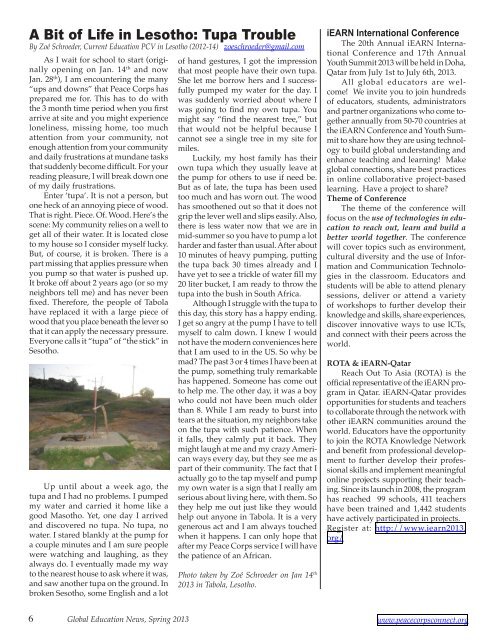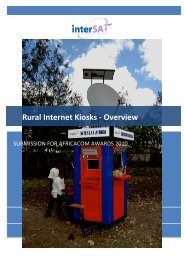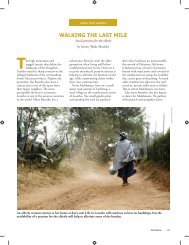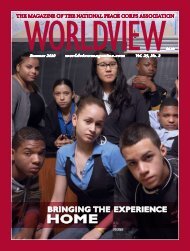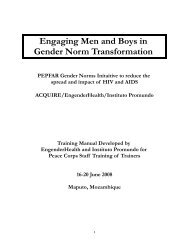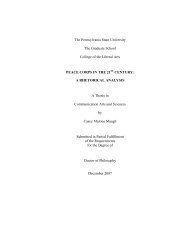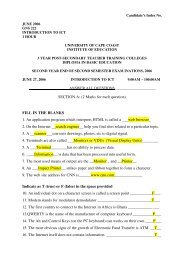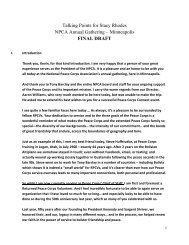Spring - National Peace Corps Association
Spring - National Peace Corps Association
Spring - National Peace Corps Association
Create successful ePaper yourself
Turn your PDF publications into a flip-book with our unique Google optimized e-Paper software.
A Bit of Life in Lesotho: Tupa Trouble<br />
By Zoé Schroeder, Current Education PCV in Lesotho (2012-14) zoeschroeder@gmail.com<br />
As I wait for school to start (originally<br />
opening on Jan. 14 th and now<br />
Jan. 28 th ), I am encountering the many<br />
“ups and downs” that <strong>Peace</strong> <strong>Corps</strong> has<br />
prepared me for. This has to do with<br />
the 3 month time period when you first<br />
arrive at site and you might experience<br />
loneliness, missing home, too much<br />
attention from your community, not<br />
enough attention from your community<br />
and daily frustrations at mundane tasks<br />
that suddenly become difficult. For your<br />
reading pleasure, I will break down one<br />
of my daily frustrations.<br />
Enter ‘tupa’. It is not a person, but<br />
one heck of an annoying piece of wood.<br />
That is right. Piece. Of. Wood. Here’s the<br />
scene: My community relies on a well to<br />
get all of their water. It is located close<br />
to my house so I consider myself lucky.<br />
But, of course, it is broken. There is a<br />
part missing that applies pressure when<br />
you pump so that water is pushed up.<br />
It broke off about 2 years ago (or so my<br />
neighbors tell me) and has never been<br />
fixed. Therefore, the people of Tabola<br />
have replaced it with a large piece of<br />
wood that you place beneath the lever so<br />
that it can apply the necessary pressure.<br />
Everyone calls it “tupa” of “the stick” in<br />
Sesotho.<br />
Up until about a week ago, the<br />
tupa and I had no problems. I pumped<br />
my water and carried it home like a<br />
good Masotho. Yet, one day I arrived<br />
and discovered no tupa. No tupa, no<br />
water. I stared blankly at the pump for<br />
a couple minutes and I am sure people<br />
were watching and laughing, as they<br />
always do. I eventually made my way<br />
to the nearest house to ask where it was,<br />
and saw another tupa on the ground. In<br />
broken Sesotho, some English and a lot<br />
of hand gestures, I got the impression<br />
that most people have their own tupa.<br />
She let me borrow hers and I successfully<br />
pumped my water for the day. I<br />
was suddenly worried about where I<br />
was going to find my own tupa. You<br />
might say “find the nearest tree,” but<br />
that would not be helpful because I<br />
cannot see a single tree in my site for<br />
miles.<br />
Luckily, my host family has their<br />
own tupa which they usually leave at<br />
the pump for others to use if need be.<br />
But as of late, the tupa has been used<br />
too much and has worn out. The wood<br />
has smoothened out so that it does not<br />
grip the lever well and slips easily. Also,<br />
there is less water now that we are in<br />
mid-summer so you have to pump a lot<br />
harder and faster than usual. After about<br />
10 minutes of heavy pumping, putting<br />
the tupa back 30 times already and I<br />
have yet to see a trickle of water fill my<br />
20 liter bucket, I am ready to throw the<br />
tupa into the bush in South Africa.<br />
Although I struggle with the tupa to<br />
this day, this story has a happy ending.<br />
I get so angry at the pump I have to tell<br />
myself to calm down. I knew I would<br />
not have the modern conveniences here<br />
that I am used to in the US. So why be<br />
mad The past 3 or 4 times I have been at<br />
the pump, something truly remarkable<br />
has happened. Someone has come out<br />
to help me. The other day, it was a boy<br />
who could not have been much older<br />
than 8. While I am ready to burst into<br />
tears at the situation, my neighbors take<br />
on the tupa with such patience. When<br />
it falls, they calmly put it back. They<br />
might laugh at me and my crazy American<br />
ways every day, but they see me as<br />
part of their community. The fact that I<br />
actually go to the tap myself and pump<br />
my own water is a sign that I really am<br />
serious about living here, with them. So<br />
they help me out just like they would<br />
help out anyone in Tabola. It is a very<br />
generous act and I am always touched<br />
when it happens. I can only hope that<br />
after my <strong>Peace</strong> <strong>Corps</strong> service I will have<br />
the patience of an African.<br />
Photo taken by Zoé Schroeder on Jan 14 th<br />
2013 in Tabola, Lesotho.<br />
iEARN International Conference<br />
The 20th Annual iEARN International<br />
Conference and 17th Annual<br />
Youth Summit 2013 will be held in Doha,<br />
Qatar from July 1st to July 6th, 2013.<br />
All global educators are welcome!<br />
We invite you to join hundreds<br />
of educators, students, administrators<br />
and partner organizations who come together<br />
annually from 50-70 countries at<br />
the iEARN Conference and Youth Summit<br />
to share how they are using technology<br />
to build global understanding and<br />
enhance teaching and learning! Make<br />
global connections, share best practices<br />
in online collaborative project-based<br />
learning. Have a project to share<br />
Theme of Conference<br />
The theme of the conference will<br />
focus on the use of technologies in education<br />
to reach out, learn and build a<br />
better world together. The conference<br />
will cover topics such as environment,<br />
cultural diversity and the use of Information<br />
and Communication Technologies<br />
in the classroom. Educators and<br />
students will be able to attend plenary<br />
sessions, deliver or attend a variety<br />
of workshops to further develop their<br />
knowledge and skills, share experiences,<br />
discover innovative ways to use ICTs,<br />
and connect with their peers across the<br />
world.<br />
ROTA & iEARN-Qatar<br />
Reach Out To Asia (ROTA) is the<br />
official representative of the iEARN program<br />
in Qatar. iEARN-Qatar provides<br />
opportunities for students and teachers<br />
to collaborate through the network with<br />
other iEARN communities around the<br />
world. Educators have the opportunity<br />
to join the ROTA Knowledge Network<br />
and benefit from professional development<br />
to further develop their professional<br />
skills and implement meaningful<br />
online projects supporting their teaching.<br />
Since its launch in 2008, the program<br />
has reached 99 schools, 411 teachers<br />
have been trained and 1,442 students<br />
have actively participated in projects.<br />
Register at: http://www.iearn2013.<br />
org/<br />
6 Global Education News, <strong>Spring</strong> 2013 www.peacecorpsconnect.org


